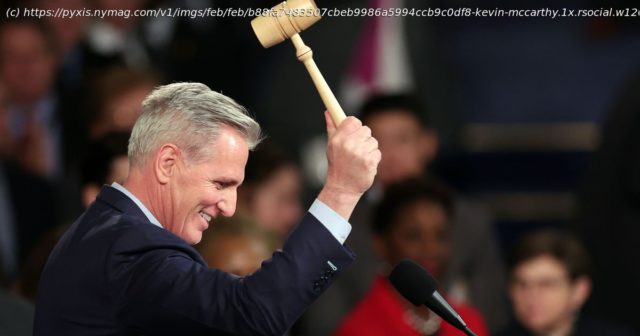Kevin McCarthy made a lot of concessions to win the Speakership. Some are mostly symbolic; others mainly involve the internal power dynamics of Republican factions. But some could wreck the fiscal process in Congress or trigger a debt default.
Anyone who watched the humiliating saga of Kevin McCarthy’s struggle to become House Speaker last week is probably aware that he and other “Establishment” Republicans lost a lot of face in order to coerce hard-core MAGA conservatives into allowing him to get the gavel. House members so marginal they were practically cartoon characters in the last Congress (e.g., Marjorie Taylor Greene, Lauren Boebert, and Matt Gaetz) walked tall on the floor of the people’s chamber, playing an outsize role in the drama.
The cringes of embarrassment from Republicans and snickers of Schadenfreude from Democrats will soon fade from memory. But the concessions McCarthy and his allies made to the rebels will have long-lasting consequences.
Some of these concessions will be incorporated into the new rules for the House that members are expected to vote on during the evening of January 9. Others are part of an until-now secret addendum that may or may not be fully disclosed by the time the rules are adopted. Either way, Monday’s rules vote will be perceived as a confirmation of the overall deal. Here, a breakdown of what exactly GOP leadership gave up to get McCarthy his gavel.
McCarthy promised the rebels early and conspicuous House votes on a number of hot-button issues, including congressional-term limits and some sort of draconian border-control measures (that’s in addition to already planned votes on abortion and on rescinding appropriations for IRS agents). Such votes may be exciting for conservative “base” voters and their media outlets and embarrassing for members and candidates running in highly competitive or blue-leaning districts in 2024. But like any other House-initiated legislation in the 118th Congress, such votes don’t amount to a hill of beans in the real world since they can easily be blocked (or, more likely, just ignored) by the Democratic-controlled Senate and vetoed by Joe Biden in the extremely remote chance that any of them get through the upper chamber.
Similarly, there are rules and operations changes that play to the archconservative conceit that McCarthy is grudgingly opening up the House to “the people” and increasing accountability. But these changes, such as the relaxation of security restrictions on public attendance of House proceedings and the abolition of voting by proxy, don’t mean a lot substantively. They will make life harder and more dangerous for House members but don’t have any direct legislative significance.
Finally, there are concessions that simply sharpen and entrench moves that most Republicans already wanted, like the establishment of a Select Subcommittee on the Weaponization of the Federal Government to do a deep dive on GOP claims that the Obama and Biden administrations used federal agencies to persecute conservatives.






